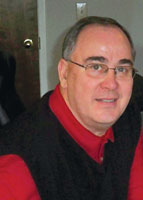2009 CEOs Who 'Get It'
 Timothy J. Whitener
Timothy J. Whitener
CEO
Luwa Inc.
Luwa Inc., located in Winston-Salem, NC, is an HVAC specialty contractor providing air engineering, controlled environmental, piping systems, filtration, fabrication, mechanical and construction management services to customers in the United States. Luwa employs 950 workers.
Why is safety a core value at your company?
We are a mechanical construction company – meaning we work extensively with ductwork, piping, filtration equipment, air handling and refrigeration equipment – in both a fabrication and field construction environment. In addition, we have approximately 350 vehicles on the road every day providing not only construction-related services, but also after-market maintenance activities. As such, our employees are exposed to a number of work-related risks in the daily performance of their jobs. So, for us, it is not only about our employees returning home every night in the same condition that they began the day, but it is also a bottom-line issue. Being a self-insured contractor for our workers’ compensation costs, every dollar spent hits the bottom line.
In addition, it is a competitive issue for us. Without a strong safety program, we would not be allowed to bid on certain projects, and safety is one of the core values regularly evaluated in proposals we submit to clients.
We continually make our employees understand that safety is not an option – and that we will not and cannot tolerate any disregard for our safety policy. The risks for all concerned are much too high.
How do you instill a sense of safety in your employees on an ongoing basis?
Safety is at the forefront of everything we do. Our safety planning and implementation starts with a long history of safety excellence. Our policy is to achieve a safe and healthful work environment by integrally involving our employees in all aspects of the safety and health program. We use a number of methods to ensure we are instilling a sense of the critical nature of our safety performance with our employee group. We hold quarterly state-of-the-business meetings with our various locations and their employees, all of which begin with a safety topic.
We measure our safety performance at all location/project levels – driving our factors down as far as possible within the organization. We celebrate significant safety milestones with those units that have achieved them. We also conduct toolbox meetings on an ongoing basis to ensure our field employees understand our company’s commitment to all things safety-related.
We attempt to get all of our management staff involved in the safety process – when they visit jobsites to do the safety audits, the housekeeping reports, etc. We believe that this active participation demonstrates our senior management’s commitment to safety.
How do you measure safety?
We use a number of different measurement criteria. Typically, we are called on to provide our safety record information for bid qualifying purposes. These requests usually ask for our recordable injury rates as well as our workers’ compensation insurance experience modification rate.
At the Corporate Staff and Safety Committee level we have developed a tracking system of leading indicators, such as participation in the monthly corporate Safety Committee teleconference, and completing weekly site safety audits and monthly vehicle inspections.
We also have a third-party provider that assists in monitoring our fleet drivers’ performance, and we review all of our motor vehicle accidents to identify causation and adequate corrective actions. All of this data is reviewed and used to assist in identifying any safety program elements that might need added attention or upgrades.
We also measure at the operational level. Accidents, the costs of accidents, mod rates, etc., are all measured at the lowest operating level possible within the company to drive the visibility and accountability as far down within the organization as possible.
Post a comment to this article
Safety+Health welcomes comments that promote respectful dialogue. Please stay on topic. Comments that contain personal attacks, profanity or abusive language – or those aggressively promoting products or services – will be removed. We reserve the right to determine which comments violate our comment policy. (Anonymous comments are welcome; merely skip the “name” field in the comment box. An email address is required but will not be included with your comment.)

